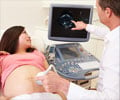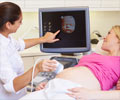For first time ever, researchers were able to decrease Alzheimer's symptoms with the help of MR imaging-guided focused ultrasound.

The microbubbles vibrate when they pass through the ultrasound beam, temporarily creating an opening in the BBB for the drugs to pass through. In addition, this combination of ultrasound and microbubbles has been shown to increase the number of new neurons and the dendrite length.
The researchers used MR imaging-guided focused ultrasound with microbubbles to open the BBB and treat the hippocampus of the mice.
The researchers treated each side separately to be as accurate as possible in their focus of the ultrasound beam. They found the treatment led to improvements in cognition and spatial learning in the transgenic mice, potentially caused by reduced plaque and increased neuronal plasticity due to the focused ultrasound treatment.
They found no tissue damage or negative behavioral changes in the mice due to the treatments in either the transgenic mice or the control (nontransgenic) mice. Both groups of mice benefited from increased neuronal plasticity, which confirms the previous research on the effects of MR imaging-guided focused ultrasound on plasticity in healthy mice.
Source-ANI















